Do you want to know how to get power? We all know someone who exudes it— they may be a master of nonverbal power, have a powerful voice, or be in a position of power. Can you identify what makes them powerful?
Whether in work or in a personal relationship, we are constantly trying to judge someone’s power. But power has an interesting truth: it can be gained or lost in an instant. Even based on appearance alone.
Here’s what I mean…

Researcher Anthony Little and his colleagues “modified” the faces of candidates from 8 different political races in 3 countries. They changed the faces using computer software to make them unrecognizable while still keeping the candidates’ facial features intact. Then, the researchers had participants vote on who would be the better leader.
In all 8 races, the participants chose the face of the politician who had actually won the election.
In other words, there is a “look” to people who command power, and we know it at a subconscious level.
Power can be earned and learned.
In fact, many hidden dynamics exist that rule our choices when it comes to power.
Let’s look at exactly what these forces of power are.
What is Power? (Definition)
Power is the ability to influence the behavior of others.
We pay attention to powerful people because we know that they can create change—and we like to know who’s capable of creating change. Powerful people influence the behavior of others, change institutions, and make big impacts in business. Are you one of them?
How to Gain Power (and How It’s Measured)
There’s one lie about power that we’ve been told—that the key to a powerful career, loving partner, and amazing friends is something people either have, or don’t.
But that’s not the case. Forbes comes out, yearly, with a list of the most powerful people in the world. That list is constantly changing, with newer, more powerful people taking the top positions. Here are the 4 variables they listed that make up power:
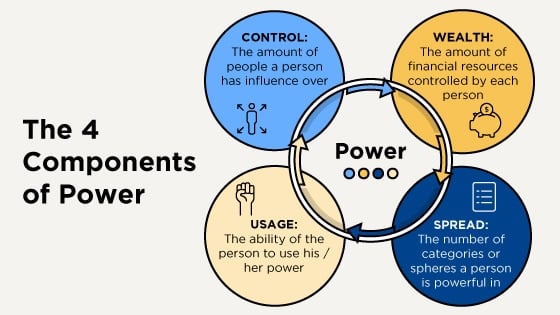
It’s amazing how simple power is when you break it down into these 4 elements (and sometimes, you don’t even need all 4 elements to have great power).
For a real-life example, let’s take a look at #5 on the Forbes list: the CEO of Amazon, Jeff Bezos:

- Control? Amazon has almost 1 million employees.
- Wealth? A lot—Bezos has a $148.6 billion net worth, as of May 1, 2020.
- Spread? Besides Amazon, he also owns the Washington Post and Blue Origin, an aerospace company.
- Usage? Yes, his influence is everywhere. Jeff Bezos is a household name.
Of course, real power doesn’t have to be seen at such a grand scale. We see powerful people everyday—those that have great power in social situations, small companies, and in relationships—power doesn’t need to be so large.
Power can be exercised on a small scale.
Who’s the most controlling in your company or in your social interactions? Who has the biggest impact on your finances? Who are the people that affect multiple areas of your life? Are they exercising their power?
These are the questions that you should ask yourself to find the truly powerful people in your life. And likewise, ask yourself: “Do I have power in my life?”
If not, you can always earn more power! All you have to do is understand the science behind it.
To make this easy, I have created 8 “Laws of Power” based on the latest research—and they happen to be particularly valuable in business.
Note: Power doesn’t necessarily mean “evil.” The beauty of power is that it can be used for good, too. Having greater power means you can decide to do what you want with it.
Here are the 8 Laws of Power you should know.
Power Law #1: Utilize the Power-Confidence Loop
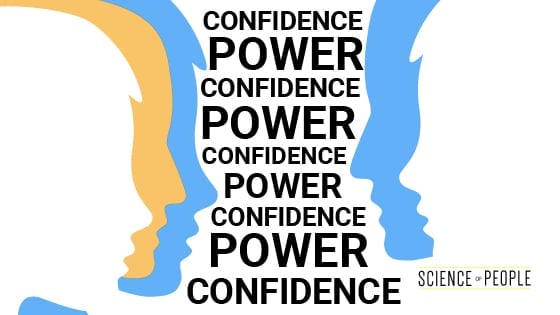
How do powerful people think? Let’s get inside the heads of powerful people.
Did you know that powerful people believe more in their own thoughts and ideas?
Research has found that powerful people are more self-assured, so they tend to find their mistakes, failures, and breakups easier to handle. This also gives them more confidence.
Confidence and power go hand in hand in what I call the Power-Confidence Loop.
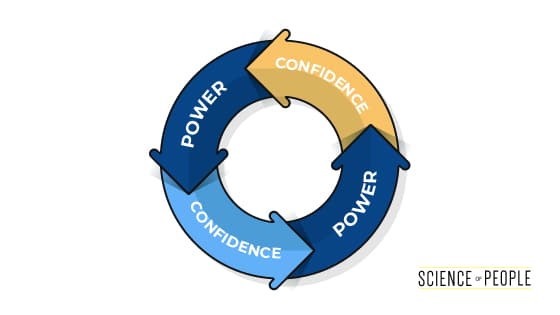
The loop goes like this… the more confident someone is, the more deserving of power they feel. The more deserving of power they feel, the more power they command and the more confident they become! In this way, confidence and power feed each other in a loop.
Power isn’t just about affecting the people around us, it also defines our self-esteem.
Real power works by energizing yourself and others from a place of stability and self-worth, not by demanding power from other people’s fear or arrogance. People with real power receive real benefits:
- More persistence. Powerful people are confident in their attitude and actions, and research finds they are more persistent. They will focus longer on a single task before moving to the next, and avoid multitasking.
- First to take action. Powerful people are often the first to take action in emergency situations or high-stake negotiations in the workplace. (Though, perhaps this is the powerful person’s kryptonite—when powerful people do not know what to do, they can really get stumped and take longer to make decisions.)
How to Be More Powerful: Start with your self-worth. If you want to up your power, you should build up your inner confidence. This is the fastest way to become more powerful. Here is an article and video on 20 ways to feel more confident right now:
You are in control of how powerful you feel.
Power Law #2 Use Powerful Language
Here’s some frightening food for thought: we have more negative words in our vocabulary than positive words.
What?!
Robert Schrauf, linguistics professor at Penn State, asked two sets of participants—one group in their twenties and the other in their sixties— to write down as many words as they could think of in 2 minutes that express emotion.
Here’s the surprising result:
- Half of all the words the participants wrote down were negative (like fear, anger, and sadness).
- Only 30% were positive (like joy) and 20% were neutral (such as surprise). And this is regardless of age or culture.
If you want to be more powerful, it’s time to change your vocabulary.
Unlike negative words, studies suggest that positive words and phrases improve cognition and induce more positive emotions in people.
In short, positive words create powerful people.
Words can be used to both describe your emotions and DIRECT your emotions. This can be an incredibly easy way to step into your power.
This is called priming psychology. Your words are powerful—if you know how to use them.
Start by kicking these phrases out of your brain completely.
1. I can’t …
2. I don’t believe …
3. I’m bad at …
4. I’m afraid of ….
5. It’s impossible…
In fact, don’t only remove them from your vocabulary—
Stop exposing yourself to negative talk entirely.
If your Monday morning water cooler conversation involves hearing “I’m so bored by my job,” “My boss is awful,” and “I’m so tired,” know that these phrases will sap your energy… energy that you need to be happy and successful and motivated.
Try to redirect these conversations into something more positive, or—if your teammates aren’t receptive to that—remove yourself from this type of negative talk.
Removing negative language is a great start but you need to do more than that.
Replace the above negative phrases with these:
1. I can …
2. I know …
3. I will …
4. I am confident …
5. Anything is possible.
Is your mind constantly stuck on negativity? Alison Ledgerwood gives an amazing TED talk on how to get rid of your own negative thoughts:
Another thing you can try is using positive affirmations. Studies show that positive affirmations help individuals restore their self-competence and self-worth when faced with difficulties. There are tons of positive affirmation YouTube videos you can find online.
How To Obtain More Power: The more powerful words you use, the more you will feel powerful and will incite power. Think about strengthening your language.
Power Law #3: Speak with Power
One of the best ways to gain influence and power is to use your natural ability: your voice.
Research has even found that we assess someone’s power simply by hearing the sound of their voice. Powerful people have more resonance and are less nasal. Think of a violin vs. a guitar. We like deeper voices. This is because we can learn a lot about someone’s emotional state from their voice.
Watch our video below to learn the 8 laws of power and how to be more powerful:
Someone who is anxious or lying has more limited breathing, raw tension, and tight shoulders. This creates less vocal resonance, less volume, and more subglottal pressure. This makes the voice sound tight, small, and nasal. When we feel powerful, we breathe more deeply and our voices become lower.
Researchers even found that the amount of dominant sounds made by one candidate over another accurately predicted the outcome of upcoming elections!
The deeper-voiced candidates win every time.
It’s no wonder that Theresa May, Forbes’ #14 most powerful person, has a very deep voice:
Here’s an example of how voice can change: Margaret Thatcher was underestimated due to her gentle, soft voice. So she underwent an astounding vocal transformation to sound more powerful and be taken more seriously. See how the power in her voice sounds before and after:
If you want to increase your power, make sure you are relaxed, breathing deeply, and using the lowest end of your natural register.
How To Sound More Powerful: Learn to speak with confidence.
Watch our video below to learn how to sound confident on the phone with these 5 simple steps:
Power Law #4: Build Your Personal Board of Directors
This is an important one.
Powerful people know how to ask for help. They also know how to give help.
It’s time to think about building a powerful network around yourself. Not just your immediate team, but beyond. I call this a personal board of directors.
Personal Board of Directors or Mastermind Groups:
Groups of like-minded people who offer each other peer support, brainstorming ideas, and who promote accountability. They are typically goal-oriented and success-driven.
The Inklings was an old literary group founded in the early 1930s, and consisted of famous writers like C.S. Lewis and J. R. R. Tolkien. Even Benjamin Franklin created a mastermind called the Junto to discuss morals, politics, philosophy, and business.
Behind every great mind, there is a mastermind.
But you don’t have to be a famous writer or Founding Father to benefit from a mastermind.
Industry friends, contacts in other fields, experts, and interns… if you develop a network of people you admire who have a similar goal-oriented outlook on life, you will find their habits will stick on you. You will find that you’re more ambitious. You will even find, according to the American Society of Training and Development, a 65% likelihood of achieving your goals.
Warning: When you’re building a network, do it with sincerity. Don’t go into this trying to use people or seeing people as commodities. Remember… you’re developing the type of acquaintances, colleagues, and friends who will help you along your journey to success. And in return, you should offer your value, too.
Helpful people will be the exact opposite of those who stand around a water cooler complaining about how boring their job is and how tired they are.
How to Gain Power: I like to have at least one influencer, one mentor, one connector, and one supporter in my Personal Board of Directors. Do you have these in your life?
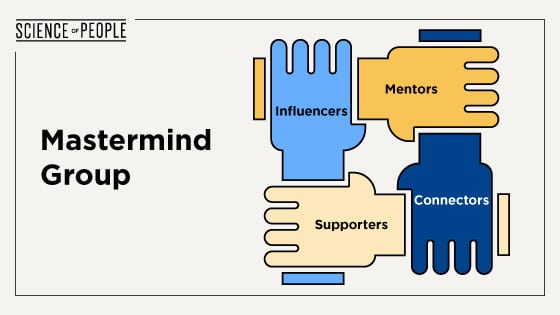
- Influencers: Influencers have always played a huge role in networks, but particularly in the modern day. Influencers often have large audiences, or might just be considered the leader of a circle of office friends. Connecting with these people gives your own presence a bit of a boost—though you shouldn’t rely too heavily on others.
- Mentors: These are the people you reach out to when you need their wisdom and guidance. They could be connections from university, or more senior people in your business. You can learn from their mistakes and their successes, and use this experience to guide your own decisions.
- Connectors: Typically, connectors are outgoing extroverts who are well known in their industry for introducing all of the right people at the right time. They know exactly who is who, understand the goals of the people in their network, and know who will add value to the various groups within it.
Approaching the connectors in your network can help you extend your connections.
- Supporters: Within your network, identify the supporters. You probably already have a few! These may be old friends from school, family members, or friends in similar careers. The supporters do exactly that—support. They are the people you can call before a big event to give you a pep talk, or you can send a long, rambling email and “unload” your business problems to them.
Some of your supporters will give you practical advice or help, like proofreading the new text for your website or advising you on how to deal with a difficult negotiation. Others will give you emotional support so you stay optimistic and motivated even on the most difficult of days.
Forbes’ #13 powerful person, Mark Zuckerberg, talks about the importance of learning from the people around you in this clip:
Power Law #5: Your 5 Power People
This is one of my favorite quotes:
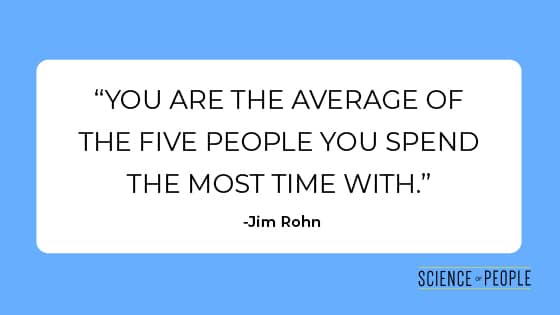
Who do you spend the most time with? Quickly, make a mental list the 5 of them now:
Be honest with yourself—this is not your ideal 5 people. It’s the current people! Take a look at your list. How do they make you feel? Are you happy with those folks? If not, you might try some relationship management.
Now do your ideal list. Who do you wish you spent the most time with?
Here’s some crazy science, from a 2017 study by Northwestern University:
People who sat within 25 feet of a high-performer at work improved their own performance by 15%. But sitting within 25 feet of a low performer hurt their performance by 30%.
Now take a look at your top 5 people again. If they’re hurting you or bringing you down, their negativity is affecting you as well.
In fact, I like to think of the 5 people I spend the most time with as my…
Power People:
The 5 people who influence your self-esteem, actions and feelings the most.
Perhaps it’s time to say goodbye to old friends or start networking for new ones. Science suggests that effective networking can give you new opportunities, help you achieve personal development goals, and lead you toward more collaboration with your peers.
Warren Buffet, the #16 most powerful person, describes the importance his father and wife had on his success:
So the question is… Do you like the 5 people you spend the most time with? Are they serving you?
How to Be More Powerful: Do a people check.
- Say no to the toxic people in your life (7 types to be aware of).
- Get rid of fake friends.
- Build more genuine adult friendships.
Watch our video below to learn why fake friends are ruining you and how to end a friendship:
Power Law #6: Self-Assess
We all think we know ourselves. Unfortunately, this usually isn’t the case.
Generally, studies suggest that people only have a weakly to moderately accurate sense of their character and skill.
In other words, we are bad at defining who we are.
So why are we so bad at assessing ourselves honestly?
It’s partly because the mechanisms we have for understanding ourselves lay deep within our subconscious. It’s also partly because it’s a defense mechanism to protect us from complete self-honesty. Think about it: if we were completely honest with ourselves about all our faults, we’d be completely devastated!
We all trick ourselves into thinking we are more successful than we really are. This can be a great thing! Who would want a life where their thoughts were occupied only by all of their own flaws?
It’s important to find a healthy balance between obsessively nitpicking at your flaws, and reviewing yourself regularly to make sure you’re on track for a successful future.
There are many different ways you can assess yourself. You can work out your personality type, keep a journal, use self-knowledge quizzes, or use an app on your phone to monitor your goals, your happiness, and how you spend your time.
Some people even find it beneficial to take up yoga or spend part of the day on meditation and inward reflection.
It can be difficult to go head-to-head with your flaws, but our flaws often hold us back.
Being aware of your flaws—and either accepting them or working to change them—can be an important step on the way to power.
Because when you learn to accept your flaws, you no longer feel unacceptable. You no longer have pressure that you’re out-of-place. And you no longer try to impress.
Jack Ma even acknowledges his “ugliness” and unsupportive upbringing. Yet, he doesn’t let that stop him from being the #21 most powerful person:
How to Get More Power: Powerful people are accurate at self-assessment. They know their strengths and weaknesses and how to leverage them. It’s time to take stock of yours!
- My biggest strengths are:
- My biggest weaknesses are:
- I need to learn how to _______.
I highly recommend finding and focusing on your A work. This is one of my favorite power-inducing activities! When you do your best work, you are more confident and do better work:
Power Law #7: Know When To Say YES (and when to say no!)
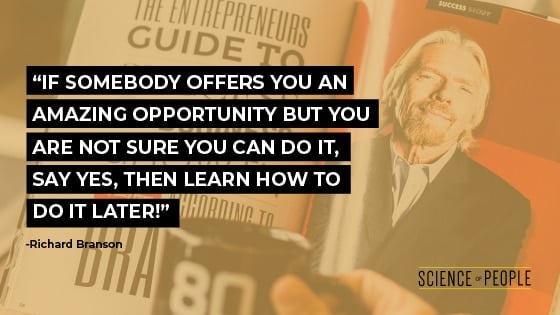
Opportunity in life is nothing, if you’re not willing to say “Yes!” to it.
And, if opening doors to new opportunities and experiences isn’t convincing enough, scientific studies have also shown that keeping busy makes us happy!
But just like the other “laws” written here, the trick is all about balance. If you say yes to everything, you won’t have time to work on your goals.
Powerful people not only know what they are good at, but they are also judicious about how they spend their time. Research from the University of Kentucky found:
“The judicious expenditure of self-control resources among powerful people may help them prioritize their efforts to pursue their goals effectively.”
In other words… Powerful people say no. Saying “no” is an important part of staying focused on getting where you want to be in life. Here’s how to say no:
Imagine this: a friend who you haven’t seen for several years is in town for the night and has asked you to go for dinner. But you have a deadline for a new project, and you really want to make it good to impress your colleagues. Which do you choose?
When you need to decide whether to say no, ask yourself these questions:
- Does saying no feel like relief? Sometimes it is hard to tap into your intuition. I find the easiest way is with a little thought experiment. If you are thinking of saying no, pretend you have already said no. Do you feel relief? Then you should say no. Do you feel regret? Then you should say yes.
- Does saying no help or hinder your long term goals? How does saying yes (or no) help or hinder you, long term? Would dinner with your friend significantly cheer you up after a bad week? Would this deadline be a case of “make or break” in your industry?
- When looking back on this moment later in your life, which would you determine as being the most important? Sometimes, the events that feel really big and important now, you won’t reflect on later as having so much importance.
The trick to power often comes from knowing when to say yes and when to say no. And it’s all about trusting your intuition. Say yes to: “I want power!” And no to: “I want to waste time!”
Kenny Nguyen gives an amazing TEDx talk on the art of saying no:
The bottom line: don’t waste time on fruitless ventures—but don’t close the door to opportunity, either.
Power Law #8: Stand Like Superman
Want to know one of the best tips on how to gain power and influence? Try changing your body language.
Powerful body language can be the difference between a killer presentation and a complete flunk.
Imagine someone you consider to be powerful. How are they standing in your mind’s eye? It’s likely they are standing shoulders back, head up, perhaps with their palms open.
Openness and expansiveness are associated with powerful people.
A study published in Psychological Science found that good posture directly helps us feel more confident. Here’s why:
- When we stand broadly, or walk and sit erect, we take up more space.
- This allows us to take in deeper breaths, which in turn helps us feel stronger and more solid.
- Gestures also help us be broad. Gestures enlarge our physical presence and help us become more powerful communicators.
Powerful body language doesn’t only help the people around you to see you as powerful, but it also develops your inner sense of competence and strength.
Just take a look at Jeff Bezos and his powerful, wide hand gestures when he is talking:
How to Be Seen as More Powerful: Let me give you a precise list of what you can do to be more powerful. In one study, participants were given a long list of behaviors and asked to select which cues were characteristic of powerful people. The most common answers for high-power individuals were:
- More frequent initiation of handshake
- Make more and longer eye contact
- Use broader gestures
- Open posture
- Lean forward
- Orient the body and head toward others
- Animated hands
- Self-assured physical expression
Do these things in your next important meeting!
Remember: Be Yourself
Gaining power is not only about following the 8 Laws. Here’s the most important one:
Be authentic.
Studies have shown that being authentic leads to happiness and life satisfaction. And you can only be truly powerful if you are happy and confident.
If it feels unnatural to make broad expansive gestures (see tip #7) then don’t do them! Start with another cue—like eye contact—or start with smaller gestures. If you do not feel authentic, it will show.
And don’t be afraid of showing your vulnerability, either. Elon Musk, powerful person #25, even cried during an interview when he talks of his “idols” rejecting his idea and saying he’ll never make it:
One of the best ways to be more powerful? Lean into what makes you you.
Spend time enjoying your own company. Find hobbies that fulfill you. Spend time with people you actually like. Practice what you preach.
Authenticity means aligning your words, actions, and beliefs.
Remember, it takes about 66 days to make a habit. So start now, and set a day on your calendar. After two months, assess whether these power laws have helped you get more power in your career, relationships, and in your life.
We think you’ll be pleasantly surprised!
More power to you,
Vanessa

I love your work and learn something new every time I read something new of yours. You have helped me engage in my personal journey of finding myself.
I love your work and learn something new every time I read something new of yours. You have helped me engage in my personal journey of finding myself.
I love your work and learn something new every time I read something new of yours. You have helped me engage in my personal journey of finding myself.
I love your work and learn something new every time I read something new of yours. You have helped me engage in my personal journey of finding myself.
thank you
thank you
thank you
thank you